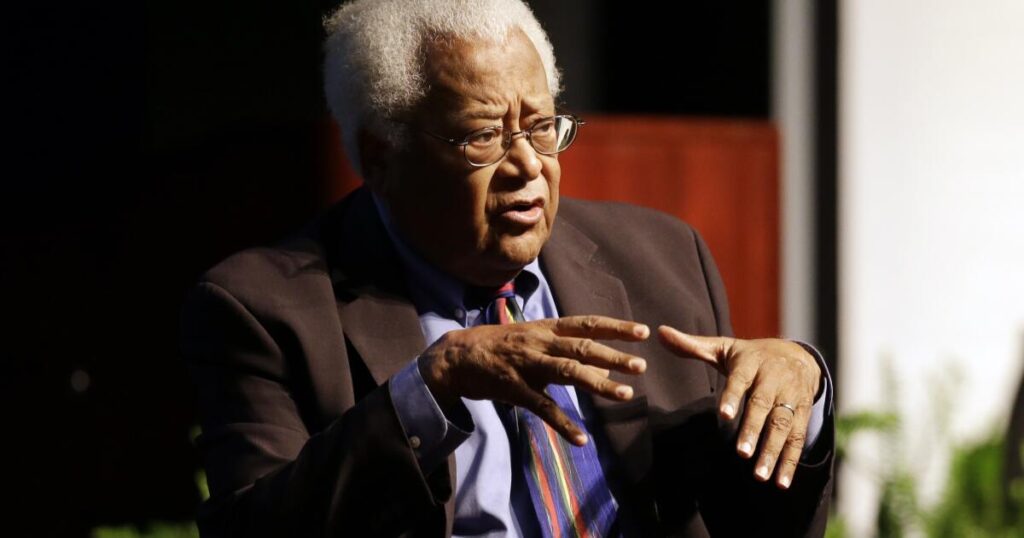James M. Lawson Jr., who died last week, was a legendary civil rights hero, pastor of Holman United Methodist Church in Los Angeles for 25 years and, in the words of Los Angeles Mayor Karen Bass, “a man who changed history.”
But for me, Jim Lawson was a great teacher.
I met Jim when I was hired as producer and co-host of his national cable TV talk show, Lawson Live, for ten years, beginning in 1995. We were perhaps an unlikely pairing — he was a Christian pastor, I was a Buddhist, and we were generations apart — but over the course of our long friendship, it was he who broadened my perspective.
Think about when we were preparing a show loosely titled “Whatever Happened to the Civil Rights Movement?”
Jim said, “Don't call it that.”
I was confused. “What else can I call it?” I asked.
“Let's call it the justice movement,” he said, because in the 1960s the issues were much more than civil rights.
He referred to the Southern Christian Leadership Conference's goal of “saving the soul of America.” While the boycotts, sit-ins, and Freedom Rides targeted racism and voting rights, in Jim's view, their deeper purpose was to challenge the harmful ideas that devalued people to the extent that they led to genocide, slavery, and later Jim Crow laws.
He was a literal teacher during his time, mentoring a generation of civil disobedience justice activists, going to prison rather than being drafted to fight in the Korean War, traveling to India to study Gandhian nonviolence and bringing that strategy with him to the U.S. When he watched Lawson and his students take over the counters of Southern diners, they saw a discipline in the face of danger that was deeply rooted in the philosophy of nonviolence.
Instead of succumbing to anger, he argued, we must respect the dignity and nobility of those with whom we disagree. We must listen. We must realize that violent thoughts, words and actions only incite more violence, and we must build connections instead of stoking division. He recounted his own experience with a young man who spat on him during a protest. Jim wiped his face and asked the young man about his bike. A conversation began, and a confrontation was averted.
For Jim, such a respectful encounter was the only way transformational change of heart and mind was possible. When he met anger with generosity, he explained to me and other interviewers, he could see for himself the person's “conversion,” a change that “seemed to take a step from darkness to light.”
Jim believed that a “Beloved Community” was possible. He argued that the unrest witnessed in America was evidence of “the poisons of racism, sexism, violence, and plantation capitalism.” But as white supremacists came out in public and polls showed public dismay about race relations, he speculated that “we may actually be witnessing the collapse of American apartheid.” He warned that it would be a “messy affair” because too few people in leadership were ready to make the change.
Jim never doubted the power of a positive legacy left by one person. Though he had never met his father-in-law, when his husband's father died, he asked to attend the funeral in Pittsburgh. After arriving, he gathered information from family and friends and asked his father-in-law's six grandchildren to stand while he spoke at the funeral. Jim told them he learned that their grandfather lived by simple values: being a good man, protecting his family and working to improve his community. Would they follow in his footsteps? They agreed.
Finally, Jim showed me what sincerity looks like when no one is watching. When my mother was in a coma in a Los Angeles hospital, he regularly visited her bedside and was there for her at night whenever he had time. We only learned of this act of kindness after she passed away. He quietly became a pastor for her in her time of need. That's the kind of man he was.
How do we honor a man who changed history? By emulating his courage, his passion for truth, and his commitment to justice and peace. “I know,” Jim said, “that the forces of negativity cannot prevail. In these times of uncertainty and fear, his life of action and optimism has a lesson for us all.
Bonnie Boswell is executive producer and reporter for “The Bonnie Boswell Report,” the introductory show for “PBS Newshour” on PBS SoCal and PBS.org.



